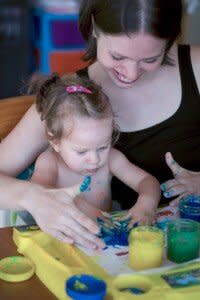Sensitive Caregiving Can Make Your Child a Successful Adult

It's no secret that interactions between a parent and child are essential for growth and development, but just how important is a sensitive approach?
According to a new study, parents should strongly focus on sensitive caregiving during the first three years of their child's life. The study's findings, which appear in the journal Child Development, correlate sensitive caregiving with an individual's long-term social and academic success. Researchers define sensitive caregiving as, "the extent to which a parent responds to a child's signals appropriately and promptly, is positively involved during interactions with the child, and provides a secure base for the child's exploration of the environment," reports Science Daily.
For the study 243 mothers in their third trimester were recruited. All the mothers were living below the poverty line and represented various ethnic backgrounds and races. The mothers and their children were observed four times within each child's first three years and then multiple times until the child reached age 32. During childhood and adolescence, teachers also assessed the children's social interactions with their peers and administered standardized tests to evaluate academic performance. Once the kids reached their 20s and early 30s, researchers conducted interviews to evaluate their romantic relationships and educational achievements.
Results showed that children who received attentive, sensitive caregiving were consistently more successful, both academically and socially, than those who did not. These children also received higher test scores throughout their adolescence. As adults, they achieved higher levels of education and had greater success rates with intimate relationships. However, there was a more substantial impact on the individuals' academic accomplishments than how well they functioned socially.
"Altogether, the study suggests that children's experiences with parents during the first few years of life have a unique role in promoting social and academic functioning--not merely during the first two decades of life, but also during adulthood," says Lee Raby, co-author of the study. Uninterested or hostile parenting not only have a negative impact on kids immediately, but it continues to affect them through every stage of their lives. Although Raby's study observed children who were born into poverty, he believes that the results would be the same if financially secure families were involved, notes The Huffington Post.
For Raby, the next step in the research is to determine if moms with access to parental support programs during the first few years of their kids' childhood will have a positive impact on their adulthood. But based on the current study, parents should continue to nurture their children, be conscientious to their needs, and acknowledge their achievement with praises.
Caitlin St John is an Editorial Assistant for Parents.com who splits her time between New York City and her hometown on Long Island. She's a self-proclaimed foodie who loves dancing and anything to do with her baby nephew. Follow her on Twitter: @CAITYstjohn
Image: Mother and daughter painting via Shutterstock
